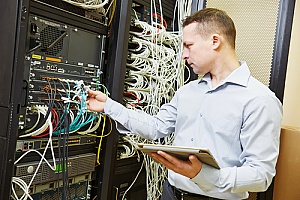 Servers are the modern backbone of most companies’ IT functions. Crucial business operations such as email, data storage, hosting and more all depend on servers operating reliably and efficiently. While many companies have turned to cloud servers hosted by providers like Amazon Web Services or Microsoft Azure, a sizable percentage of organizations choose to use on-premise servers instead, or utilize a hybrid strategy that complements on-premise servers with additional cloud servers. Whichever approach a company takes, keeping on top of proper server maintenance is crucial for keeping any business up and running.
Servers are the modern backbone of most companies’ IT functions. Crucial business operations such as email, data storage, hosting and more all depend on servers operating reliably and efficiently. While many companies have turned to cloud servers hosted by providers like Amazon Web Services or Microsoft Azure, a sizable percentage of organizations choose to use on-premise servers instead, or utilize a hybrid strategy that complements on-premise servers with additional cloud servers. Whichever approach a company takes, keeping on top of proper server maintenance is crucial for keeping any business up and running.
Server maintenance entails everything from monitoring server performance to managing the underlying hardware and software components. By practicing regular server maintenance, organizations protect themselves against risk of slowdown or downtimes, ensure their architecture is scalable with business goals and achieve greater levels of security.
Virtual Servers & Their Advantages
Virtual and cloud servers are gaining more market share every year and are now a core part of most businesses. One of the key benefits of virtual servers are their capability to host multiple servers on one piece of hardware. This offers businesses enormous scalability benefits over physical servers, which are typically limited to one server per piece of hardware. By lowering the hardware requirements, virtual servers also help drive business efficiency.
While they can be more complex than traditional, physical servers, they can also act as a force multiplier. Hosting multiple servers at once allows virtual servers to complete multiple tasks in just a fraction of the time it would take to run the same tasks in sequence on one physical server.
Management Of Software vs. Hardware
There are two main focus areas when approaching server maintenance: hardware management and software management. While the server itself is technically strictly a piece of hardware, a server with no software is relatively useless, functionally. Therefore, proper server management requires a balance of both hardware and software expertise.
Hardware Management

When installing new components or checking existing hardware, it’s also important to give careful thought to how you’ll need that server to perform. Do you have enough computing and storage to meet current business requirements? Is there extra built-in if demands increase, or do you have a plan to scale up to future requirements? On the other hand, you might have more server capacity than you can come close to using, meaning you are wasting valuable budget and resources. It’s important that you invest enough to be scalable, without overpaying for capability that you don’t need.
Software Management
After assessing and managing the server’s hardware, businesses will next need to evaluate the software running on the server. Some companies will have dozens of software applications running together in their stack, and these can often overlap or conflict with one another. Software also needs to be maintained to keep it secure and up to date with the latest security and update patches. It’s also best to eliminate any old or redundant software that may be impeding operations.
Internal Server vs. External Server Management

However, internal configurations can also be more complex to manage, or require a deeper bench of in-house staff. External server management, on the other hand, can provide greater levels of reliability, but can also open up added security concerns.
Reach Out To An Experienced Managed IT Services Provider
TCB 24×7 Expert Network IT Support is an innovative managed IT services provider that focuses on ushering in flexible and efficient solutions that are tailored towards each business’s present and future needs to ensure onward development and satisfaction. We are experienced and passionate about taking you from where you are, to the front role of your industry through actionable insights and cutting-edge technologies.
Our IT specialists can’t wait to know you, what you are trying to achieve, and every other variable that could impact on your long-term success to better customize our recommendations and solutions. Give us a call at 703.204.2958 or request a consultation online. Let us cater to those problems and turn your challenges into more breakthroughs with our 24/7 support, innovative mindset, and cost-effective, result-driven solutions.
